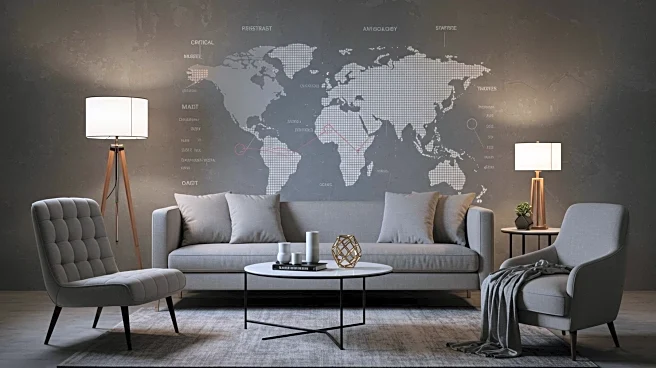What is the story about?
What's Happening?
President Trump has announced a potential increase in tariffs on furniture imports to the United States, a move that could significantly impact both domestic and international markets. The announcement was made on Truth Social, where President Trump stated that an investigation into all furniture imports is underway, with a decision expected within 50 days. The proposed tariffs aim to boost domestic manufacturing in states like North Carolina, South Carolina, and Michigan. However, the policy has already affected American companies such as the Howard Miller Company, which recently closed due to unsustainable costs exacerbated by existing tariffs. The potential tariff increase has also caused concern among European furniture manufacturers, particularly in Italy, where exports have already declined due to tariff uncertainties.
Why It's Important?
The proposed tariff increase could have wide-ranging effects on the U.S. furniture industry and international trade relations. Domestically, the tariffs are intended to revitalize American manufacturing, potentially creating jobs and boosting local economies. However, they also pose a risk of increasing costs for consumers and businesses reliant on imported goods. Internationally, the tariffs could strain trade relations, particularly with countries like China and Vietnam, which are major furniture exporters to the U.S. European manufacturers, especially in Italy, are also concerned about the impact on their exports, which could lead to economic losses and job cuts in the sector. The situation underscores the complexities of global trade policies and their potential to disrupt established economic relationships.
What's Next?
The furniture industry and international trade partners are likely to closely monitor the outcome of the U.S. investigation into furniture imports. If the tariffs are implemented, affected countries may seek to negotiate trade agreements or retaliate with their own tariffs. The European Union, for instance, may push for more favorable trade deals with other regions to offset potential losses in the U.S. market. Additionally, domestic stakeholders, including manufacturers and retailers, may lobby for exemptions or adjustments to the proposed tariffs to mitigate negative impacts on their operations.
Beyond the Headlines
The tariff proposal highlights broader themes in U.S. trade policy under President Trump, focusing on 'Made in America' initiatives and reducing reliance on foreign manufacturing. This approach reflects a shift towards protectionism, which could have long-term implications for global trade dynamics. The policy also raises questions about the balance between protecting domestic industries and maintaining competitive pricing for consumers. As the situation develops, it may influence future trade negotiations and economic strategies both in the U.S. and abroad.

















